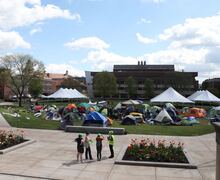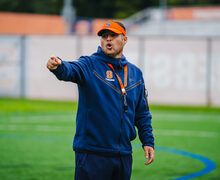Professor: SU hasn’t changed since protests against anti-Black neglect
Elizabeth Billman | Senior Staff Photographer
I guess it should be said: I write this piece at my own risk.
To live or to learn. Or, conversely, to live or to teach: These are the questions.
Unfortunately, for those of us who are black — and perhaps many others — these questions are not new. As a professor here, I have seen what institutional neglect sounds and looks like. I have listened, with frustration, with anger and with profound disappointment to the trite platitudes that flow from duplicitous, or perhaps incompetent (I’m not sure which is which anymore) lips. I have seen tongues form apologies for anti-blackness: the comment about “jurisdiction” here, the “shock” and “outrage” there. I have watched faces contort into contrition, feigning a sadness that is so shallow that it fades as soon as the face leaves the building.
And I have witnessed, time and again, the faces, hands, feet and hearts of students, faculty and staff wrinkle and wither with exhaustion. Some of these exhausted faces have left; they may have graduated or found greener pastures elsewhere. Others, like mine, remain. And each time a new scandal unfolds, we — again — set our mouths, hands, feet, faces and hearts to try and push an institution to move in a different direction. No dice: the institution remains unwavering in its commitment to anti-black neglect and symbolic and discriminatory violence.
Don’t get me wrong: “things” have been done. We are inundated with emails with words like “committee,” or “board,” or “report,” or “investigation.” Faculty are invited to engage in workshops about “bias” — and the only faculty members who attend are the ones already convinced. Students are informed of changes to codes of conduct and informed that there is now new money being set aside for those of us who aren’t white. “Things” are being done. (Relatively little) money is being spent. And yet, time and again, we find that these things, and this (relatively small amount of) money produce little by way of educational and campus equity.
The Department of Public Safety is still armed — and still here, despite the violent killings of George Floyd and Breonna Taylor and all-the-names-that-have-become-hashtags.
The Posse program has been significantly downsized — despite all that it did for students of color within and beyond the acute monetary benefits it offers.
The counseling center remains woefully understaffed.
The LGBT Resource Center remains tucked away in a remote corner of campus.
The curriculum, for the most part, remains unchanged.
I was doxxed by the DPS union.
And South Campus, while it is a refuge for many black students and students of color, remains severely over-surveilled.
After multiple student protests and multiple faculty efforts, after national embarrassment and embarrassing inertia, the institution remains, more or less, unchanged.
I guess, then, that after three years of working here, I can sadly, angrily and dejectedly say that, in the midst of a national pandemic that disproportionately kills black and brown people, I am not surprised that this institution would fail to listen to reason. I am not shocked that, despite all evidence to the contrary, we — and I am a part of this “we” — would make the decision to return to face-to-face instruction.

Biko Gray is an assistant professor of religion at Syracuse University. He was active in his support for Black student activists during protests in Fall 2019 and Spring 2020. TJ Shaw | Staff Photographer
This pandemic has laid bare the worst of this country. Profits take precedent over people; police are more valued than black lives. Sure, the symbols may change, but the structure remains the same. It cannot be surprising, then, that an institution like ours would be unwilling to do the ethical thing and go to fully-remote instruction — and then provide the resources for such instruction to occur.
I’ve been told that such a move would be economically disastrous for this institution. Some of us could lose our jobs, I’ve been told. And I don’t doubt it. The ethical move almost always costs too much. To be ethical is, as one philosopher writes, to be held hostage by the other. It is to succumb to the demands of the ones who are most vulnerable — no matter the expense. To be ethical is to pay a price. And it is clear: for us, the price tag for educational and, well, human, ethics is too high a price to pay.
But this discussion of price is an interesting one — for us, for other highly ranked and reputable schools in this country. Because, while we cannot find the money to fund ethical education, we have found money for promenades and other remodeling projects. That new Barnes Center at The Arch wasn’t cheap. That National Veterans Resource Center wasn’t cheap. And neither is remodeling the Carrier Dome. We find money to pay some of our athletics coaches — even those who don’t win (anymore) — exorbitant salaries. We fund “experiences” — of fun, of leisure. But when it comes to education, our pockets remain woefully empty — or at least near-empty.
I speak of “experiences” because we have also been inundated with emails about “experience.” We have been told that this is what students want. But, at the risk of sounding ageist, I wonder about such desires. We are all social beings. We desire connection and community — physical community. But we also know that, in this moment, such connection is risky. It can make you sick. It can kill you and others. Such risks seem not to rise to the level of serious consideration — or at least they don’t rise high enough to outweigh nebulous “desires.”
The other thing that strikes me about listening to students’ desires is that, at least for the three years I’ve been here, the administration has failed to listen to the desires of some students — black students, queer students, international students. While we don’t know how DPS uses force, or who decided to suspend and then use police against protesting students, we do know how the university will handle gatherings. Faculty are inundated with “teaching tips,” and seminars on how to make hybrid instruction work. And students are encouraged to distance themselves at an institution known for, well, “gathering.” It seems to me that only a certain kind of “experience” is being valued here. But when it comes to the other kinds, well, “we have to do better.”
In another editorial, another professor, presumably adjunct, laid out the existential problems of returning to campus. Such words will, probably, remain unheeded. I’m sure this piece will not change anything, either. But, as a scholar of black religion, I am aware that prophetic speech cannot pay heed to outcomes. As I tell my students: I speak, we speak, we resist, because. That’s the end of the sentence. We don’t speak and resist simply to change things, but because this is the right thing to do. It is exhausting, but it is necessary.
And I am exhausted. But I have to write. I write this piece because I know people who have lost loved ones to COVID-19. I have lost a loved one to COVID-19. We couldn’t have a service for him; he remains in an urn, waiting to be memorialized. We cannot even grieve properly because the disease that brings on the mourning could possibly bring more.
To be clear: I don’t want condolences. I don’t want to hear “I’m sorry for your loss.” I have enough loved ones around me who provide genuine care in the wake of death. What I want — what we need — is to take seriously the lives of people under our care. COVID-19 is a life-or-death issue. It kills. People are dying. I don’t want anyone else to die.
But sadly, I’m also waiting for that email, too.
Biko Mandela Gray, PhD
Assistant Professor of American Religion
Syracuse University
Published on August 17, 2020 at 2:05 pm




